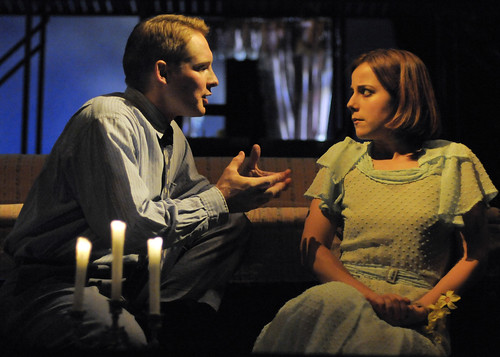
Craig Marker is the Gentleman Caller and Anna Bullard is Laura Wingfield in the Marin Theatre Company production of Tennessee Williams’ The Glass Menagerie. Below: Nicholas Pelczar is Tom Wingfield and Sherman Fracher is his mother, Amanda. Photos by Alessandra Mello
Tennessee Williams’ first brilliant move was to let everyone off the hook – himself included. By alerting the audience that The Glass Menagerie is a memory play, he removes it from reality (or not) and lets the creative team and the audience make their own accommodations as to what is memory, what is fact and what is flight of artistic fancy. In other words, you can try to get away with just about anything because it’s all a memory, right?
Marin Theatre Company’s production of Menagerie doesn’t stray too far from tradition, but director Jasson Minadakis definitely puts his own spin on the 1944 classic and gets some marvelous performances from his cast.
Minadakis’ boldest move is the inclusion of a trumpet player (Andrew Wilke) who hovers and plays above the play for the duration of its two-plus hours. The music, composed by Chris Houston, is gorgeous – aching and winsome – but to have the musician also represent the family’s absent father (the phone company worker who fell in love with long distances) is a bit of a stretch. It’s also tough to rationalize the occasional use of props (a glass unicorn, matches) mixed with pantomime (phones, food at the dinner table, dandelion wine, cigarettes) because the actors have extra work making sense of some real items and others imagined.
The fragmented aspect of memory finds physical form in the staircase/scaffolding/fire escape set by Kat Conley. If M.C. Escher designed St. Louis apartment buildings in the 1930s, this might be the result.
At the center of this angled tangle of construction is the Wingfield family: matriarch Laura (Sherman Fracher), son Tom (Nicholas Pelczar) and daughter Laura (Anna Bullard). Here is where the beauty and loving insanity of Williams’ memory play lies. This is also where Minadakis brings out some exquisite depth from most of his actors.
Pelczar brings a very real sense of Williams himself to the role, which seems appropriate given that this production is partly in honor of Williams’ centennial this year. Tom, as a character, is something of a cypher, but Pelczar is at once warm and personable and tightly coiled. There’s a sense of personality bubbling just under the surface of this restless young man who is trying so hard to be a good son and brother but is destined to fail as he becomes his own man.
The showy role of Amanda, a faded Southern belle who lives as much in memory as she does in the economic and emotional privations of her present, can send even the greatest actresses into fluttery flights of dramatic fancy. But Fracher, in her Marin Theatre Company debut, puts on a wonderful (and fiercely funny) show but somehow remains intensely focused and very real. It’s a testament to how much we like and understand her that when she shows up in a ridiculous old gown (the bright yellow monstrosity is the deft creation of Jacqueline Firkins) we find it as sad as it is funny.
Bullard in the challenging role of Laura, whose limp and other physical ills have left her an emotional shell, is still searching for her character. Her accent, which flutters from the South to the outer burroughs of New York, is problematic, but it’s one of only several unfocused aspects of her performance. When Craig Marker shows up as Jim O’Connor, aka the Gentleman Caller, he brings exactly the kind of internal light to the stage that Williams suggest made the character such a star in high school.
Marker works wonders on Bullard’s Laura – suddenly the character begins connecting, not just with him but also with the audience – and it’s easy to see why. Marker is such a dynamic presence that he’s impossible to resist. Like Laura, Jim is somewhat damaged himself. He peaked in high school and has struggled to find his way as an adult. He still retains enough big-man-on-campus charisma left to make Laura feel special just for basking in his faded glow, and that makes both of them (temporarily) happy.
The long scene between Jim and Laura does exactly what it’s supposed to do in that it pulls the audience into an incredibly intimate exchange that happens mostly in the dark (Ben Wilhelm’s lights are practically poetry in their own right). It’s a scene full of hope and affection and second chances and discovery and, ultimately, heartbreak.
The Glass Menagerie is the kind of play that reveals more of itself each time you see it. This time around it was all about how the gentleman caller breezes in and absolutely changes the Wingfield family forever. We know, essentially, what happens to Tom, but this production made me want to linger in that sad apartment and watch what happens between mother and daughter.
[bonus video]
Watch the trailer for MTC’s The Glass Menagerie.
Trailer: THE GLASS MENAGERIE at MTC from Marin Theatre Company on Vimeo.
FOR MORE INFORMATION
Tennessee Williams’ The Glass Menagerie continues through Dec. 18 at Marin Theatre Company, 397 Miller Ave., Mill Valley. Tickets are $34-$50. Call 415-388-5208 or visit www.marintheatre.org.


 The Martinez-based Kern, who grew up in Livermore, has spent 30-some years doing sound work for theaters all around the Bay Area as well as serving as a recording engineer, a filmmaker and a director.
The Martinez-based Kern, who grew up in Livermore, has spent 30-some years doing sound work for theaters all around the Bay Area as well as serving as a recording engineer, a filmmaker and a director.